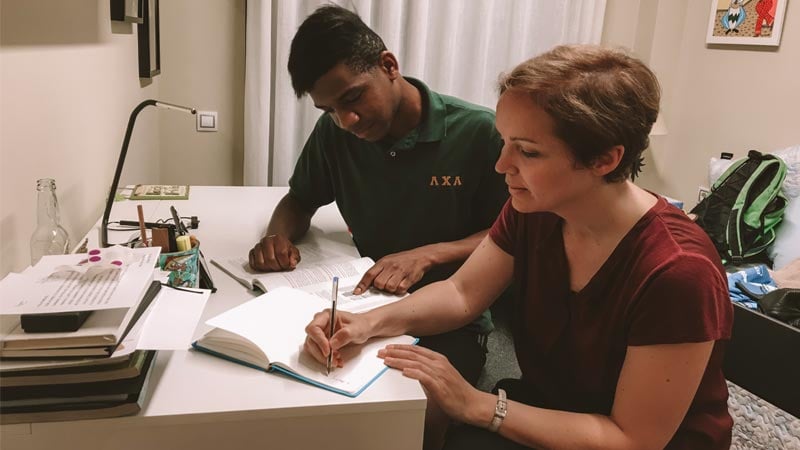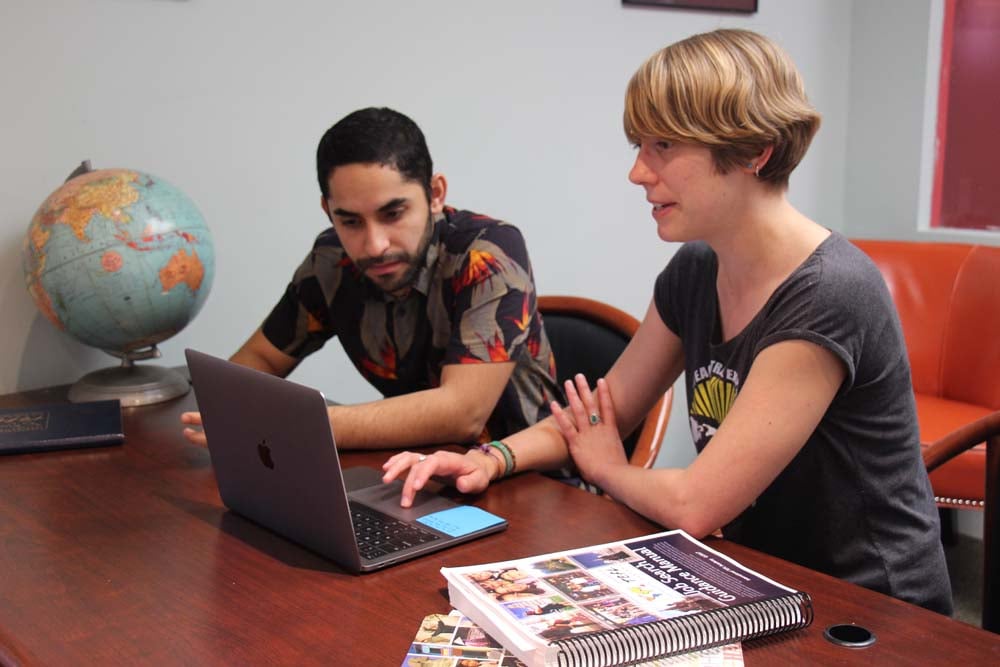7 Critical Mistakes To Avoid When Choosing The Best TEFL Course
Which TEFL course should I do? Is TEFL Certification worth it? To help you make a decision, we compiled 7 critical mistakes you must avoid when choosing your TEFL course.
Written By: John Bentley | Updated: December 7, 2023
Written By: John Bentley
Updated: December 7, 2023

Choosing the right TEFL (Teaching English as a Foreign Language) certification course will play a critical role in providing you with the training, qualifications, and job placement assistance you need to get hired to teach English abroad and online.
Let's start by addressing a few common questions:
Is TEFL Worth It?
Yes, TEFL is worth it for those passionate about teaching English abroad or online. It offers opportunities for travel, cultural immersion, and can enhance job prospects globally.
Is TEFL Certification Worth It?
Obtaining a TEFL Certification is worth it if you're looking for a good teaching job and wish to be an effective teacher for your students. Remember, most schools worldwide require a TEFL certification. Once TEFL certified, you unlock doors to apply and secure English teaching jobs worldwide.
Which TEFL Certificate Do I Need?
Look for TEFL certification courses that meet or exceed international standards (100 hours of coursework & 6 hours of practicum) and that are externally accredited. You should also consider which courses include services like job guidance that enable you to get a great job teaching abroad.
Now that we've answered the questions above, let's address the important piece: How to choose a TEFL course.
What TEFL Course Should I Do?
If you're wondering 'Which TEFL Course Should I Take? ' to realize your goals of living and teaching English overseas, here are 7 critical mistakes to avoid:
-
Taking a TEFL course that is not accredited & does not meet International standards
-
Taking a TEFL course with no live practice teaching (practicum)
-
Going cheap (really cheap) and taking a $68 Groupon TEFL class
-
Assuming that you need to take an In-person TEFL course rather than an online course
-
Signing up for a TEFL course that does not include adequate job placement assistance
-
Signing Up for TEFL course without speaking to a representative of that TEFL certification school first
-
Assuming that all TEFL courses and TEFL training certification schools are the same (and then signing up for the wrong course!)
1. Taking a TEFL Course that is Not Accredited & Does Not Meet International Standards
Some training is better than no training but if you want to earn a TEFL certification that provides you with the training you need to become a qualified teacher with a recognized qualification that thousands of employers around the world seek, then you need to make sure that you take a class that meets at least the following criteria:
- 100 hours of academic coursework and training (equal to a full-time, intensive 4-week in-person course, or the equivalent part-time or online);
- 6-20 Hours of live practice teaching (practicum) to actual ESL students (not role-playing with other teachers-in-training);
- Employs a curriculum accredited by a recognized, independent body within the field;
- Instruction is provided by a highly qualified, university-level instructor.
These standards are recognized by language schools and other institutions that employ foreign English teachers as well as major bodies within the field.
What Is the Best TEFL Certification?
A world-class TEFL certificate will provide you with the skills, qualifications, and job search guidance you need to reach your goals of teaching English abroad or online. TEFL course quality, accreditation, and staff support are all key elements for a top TEFL class.
Read more: What is Accreditation for TEFL Certification Really All About?

2. Taking a TEFL Course with No Live Practice Teaching (Practicum)
Taking a course that incorporates live practice teaching with actual ESL students is critical for two reasons:
-
First, it will provide you with experience working with actual ESL students, and this is critical for gaining the skills and comfort level you need to become a successful teacher.
-
Second, thousands of language schools around the world do not recognize TEFL certifications that do not incorporate a practicum.
A practicum should incorporate practice teaching and observation in a live setting with actual ESL students who are learning English as a second language. While role-playing with other teachers-in-training can be valuable, it is no substitute for practice teaching with actual ESL students.
3. Going Cheap (really cheap) and Taking a $68 Groupon TEFL Class
Let's be honest here. Do you think you can gain a recognized certification to teach English professionally in Germany, Japan or Dubai, or that you will receive the job placement assistance you need to get a job in Chile or South Korea, by taking a cheap course from a discount website that doesn't include live practice teaching?
Ask yourself the following: How can a university-level course cost less than a textbook? Keep in mind that Groupon gets 50% of the fee so, in this example, the TEFL school is making $34.50.
How can a university professor be paid on that? How can there be someone to advise you on finding English teaching jobs on that fee? The math doesn't add up. If you're looking for a diploma mill to just fool a prospective employer then that's what you will get.
Again, some training is better than no training and you want to earn an affordable TEFL certification in the most cost-efficient manner possible. However, TEFL courses are like anything else in that you will get what you pay for and if a price seems too good to be true, it probably is. If you take such a course simply to save money, you will pay for it in the end when you realize that the inexpensive "super-deal" TEFL program that you took won’t qualify you for the teaching positions that you want.
Taking the right TEFL course is crucial if you want to give yourself the best opportunities to go abroad to teach English and enjoy the international adventure of a lifetime. Moving to another country to live and work is not a light decision and it’s simply not worth skimping on critical parts of the process just to save a few hundred dollars here and there. It's just not worth it.
Compared to studying abroad for a semester (typically costs at least $3000 - $5000 per semester), or even going to vacation in Europe for a couple of weeks (also typically costing $2000 - $5000 at least), investing $1200-$2000 for a quality TEFL certification that will enable you to get paid to live and work in foreign countries like China, Spain and Argentina for a year or more is the bargain of the century. It pays for itself within just a couple of months of work.
In summary:
|
Reputable TEFL Courses:
|
|
Cheap, Groupon TEFL Courses:
|
4. Assuming That You Need to Take an In-person TEFL Course rather than an Online Course
Some people will assume that TEFL certification courses taken in person are automatically better or more valid than any online TEFL course. This is simply not the case. Online TEFL courses that meet international standards (such as incorporating 100 hours of coursework, 6 hours of live practice teaching or practicum, accredited curriculum, university-level professors, etc.) can and will provide you with the level of certification you need to gain the skills and qualification required for you to qualify for thousands of teaching opportunities around the world.
Additionally, an online TEFL course offers the flexibility of taking your class from the comfort of your home, or remotely from anywhere as long as you have an internet connection. For instance, International TEFL Academy offers two online TEFL courses:
- A part-time, 11-week Online TEFL Course for students who work or go to school full-time.
- A full-time, 4-week intensive Online TEFL Course for students who wish to get certified faster
At ITA, we train and certify 6,000 people a year and 70% of our graduates take their TEFL course online. Those graduates go on to gain employment in top job markets around the world from Spain, Germany, and Chile, to Saudi Arabia, Japan, and South Korea.
On the flip side, there are plenty of onsite in-person classes that do not meet international standards and will not provide you with the level of certification and training you need to gain employment. Whether you take your class in person or online, the key is to make sure that it meets the aforementioned criteria for an accredited TEFL certification course.
Read more: Is ITA's Online TEFL Certification Course Valid and Accredited?

5. Signing Up for a TEFL Course that Does Not Include Adequate Job Placement Assistance
A typical English speaker, with or without a college degree, who holds an accredited TEFL certification is qualified for tens of thousands of jobs teaching English abroad. You can take the best TEFL course in the world, or even get a Ph.D. in teaching English as a foreign language, but if you are not provided with the guidance, resources, and contacts you need to find jobs and navigate the hiring and interviewing process, your job search process will be very difficult, and you risk not being able to get hired where you want to teach.
Hiring seasons, interview procedures, and visa regulations are all matters that you will need guidance for, in addition to access to job listings, referrals to top recruiters and contact information for schools. You should be able to work with a qualified advisor who will be there to pick up the phone to assist you with questions, give you tips for getting hired, and even personal guidance on your resume and cover letter.
At International TEFL Academy, we receive more than 5,000 calls and emails each year from people who have already taken a TEFL certification course, but who are looking for job placement assistance. This is because the school that trained them did not provide them with the resources and guidance they needed to get a job teaching English abroad, and now they need help.
Before enrolling for any TEFL certification course, ask if you will receive the following:
- Real live staff to speak to, in person or on the phone, to guide you and answer your questions;
- Personal assistance with resume and cover letter development;
- Coaching on how to interview for English teaching jobs across the globe;
- Access to listings of thousands of job opportunities around the world;
- Guidance regarding hiring seasons, visas, hiring requirements and salaries;
- Referrals and contact information for top-level recruiters; government programs in countries like France, Spain, and Japan; and individual schools and language institutes.
If you do not receive this level of job search guidance, then whatever you will pay for that TEFL course simply will not be worth it.
Read more: Job Search Guidance at International TEFL Academy
What to Look For and Avoid When Considering "Guaranteed Job Placement" Programs?
While you don't need to pay extra for a job when you enroll in a high-quality TEFL course, you may opt to pay an additional program fee to a TEFL certification provider for a "guaranteed job placement." There's nothing wrong with seeking the security of knowing that you will have a job waiting for you when you complete your TEFL course.
However, when considering your options, remember that even many guaranteed placements (both fee-based programs and those that are "free") often come with strings attached and limitations when it comes to the jobs that will be available to you when you complete your certification. For example, some programs get paid by schools to recruit teachers and are under pressure to fill positions as quickly as possible, often at the expense of you, the teacher. Some programs may also pressure you to take a job with less-than-ideal working conditions or offer less-than-market value salaries and benefits.
What to look for in a quality TEFL job placement program:
- Look for programs that take your preferences into account and provide options and flexibility when it comes to your choice of teaching jobs. You should never pay for a job or accept a job that you don't want.
- Ensure that you will at least receive a market-average salary, benefits, and working conditions.
- Quality programs will provide personalized support from experienced experts in areas like documents & visas, interview coaching, and resume development.
- Provide support and guidance throughout your placement to assist with any issues that arise with your teaching job.
Read more: Guaranteed Job Placement Programs for Teaching English in Asia.

6. Signing Up for a TEFL Course Without Speaking to a Representative of that TEFL Certification School First
If you’re going to trust your time, money and dreams of living and teaching English abroad to the outcome of a TEFL course, you owe it to yourself to call the training school offering the course and to make sure that they know their stuff. You need to find out firsthand if their TEFL course is going to provide you with the training, qualifications, and job placement assistance you need to get hired as an English teacher abroad.
Critical questions include:
- Training Hours: Does your TEFL course meet international standards (at least 100 hours of training) and is it accredited – if so, by whom?
- *Hint*: Google search the name of the accrediting body and decide for yourself whether it is truly independent and well-established. Check out how long the accrediting body has existed and what other professional-level courses and certifications it has accredited.
- Course Instructors: Who will teach my TEFL course?
- If you want to become a professional English teacher, should you accept anything less than top-level instruction from experienced professors with advanced degrees (MA, Ph.D. or Delta) and qualifications? Many cheaper courses are either self-taught or assist a "tutor" who simply took a four-week TEFL certification course and perhaps taught a year or two abroad.
- Student Teaching Hours: Do your courses incorporate live practice teaching with actual ESL students (not role-playing with other teachers-in-training)?
- Note that the majority of schools around the world hiring English teachers do not recognize TEFL courses that do not incorporate at least 6-20 hours of live practicum.
- Job Search Assistance: What is the quality of job placement that is provided and what resources and personalized assistance are provided?
You should also ask about job markets and the process of getting hired once you have taken a TEFL class. Your ability to obtain a paid teaching position based on your citizenship, age, educational level, gender, ethnicity and more is something you really want to enquire about:
- Where can I teach with this certification, given my background?
- Where in the world can I teach abroad with your certification? The majority of language schools worldwide require a professional-level course consisting of 100 hours of classwork and 6 hours of practicum. A way to find out is simply to go to an ESL board, contact a school in a country and ask what that employer requires.
- If I want to teach in a specific country, what is the process?
- What is a realistic estimate of my start-up costs in addition to TEFL certification to teach in different countries?
- What’s the deal with visas and hiring seasons?
- How and where will you help me find a job and how much will that cost in addition to my course tuition? Are there "extra" costs involved in this? (This is called an "up-sell" whereby a TEFL school will offer you very low tuition and then charge you later for services such as job placement assistance).
- Are there any hidden costs such as book fees, registration fees, or fees for job placement assistance?
- When considering international courses, be sure to ask about housing costs and extra features such as language classes and sightseeing.
- What is a realistic timeline for getting my certification, getting hired and going abroad to teach? Is it a four-week, in-person class (as is typical)? If it's an online class does it have a reasonable and expected end date?
- If it's open-ended there is a good possibility you won't finish it as most people need deadlines.
If a TEFL training organization cannot answer these questions over the phone or in person in a manner that inspires confidence, then you don’t need to waste your time or money taking their TEFL course. They are not going to provide you with the level of service and guidance that you need to actually get a job in Spain, Thailand or wherever else it is that you might be interested in teaching English abroad. Look for another TEFL school.
Read more: 10 Questions You Need to Ask Any TEFL School Before Enrolling in a TEFL Class
7. Assuming that all TEFL Courses and TEFL Certification schools are the same (and then signing up for the wrong course!)
Are All TEFL Courses the Same?
There are a wide variety of different TEFL training courses that you may encounter while researching online – don’t assume that they are all the same organization or that they meet the same standards or provide the same services just because they have the word “TEFL” or “TESOL” in the name.
Also, if you plan to enroll online for a particular TEFL course, make sure that you sign up for the right course on the right website with the program that you intended!
Ultimately the questions that you need to ask and answer before investing in any TEFL certification program are:
- Will this TEFL certification and school provide me with the skills, qualifications and job search guidance I need to live my dream of living abroad and traveling the world as an English teacher?
- Am I receiving the value I deserve for my financial investment?
If you have any questions, call the organization you intend to enroll with and ask for a representative to enroll you over the phone or to guide you through the registration process. If you don’t feel like the organization you’ve contacted can answer all of your questions or provide you with the kind of support you need, keep looking and call other TEFL Certification providers for comparison.
Read more: 7 Key Tips to Choosing the Best TEFL School
Posted In: TEFL Certification, Job Search Guidance, Accreditation, Homepage
John Bentley
Co-Founder at International TEFL Academy
John Bentley is Co-Founder & Senior Writer for International TEFL Academy (ITA), the world leader in TEFL certification for teaching English abroad. A graduate of Harvard University and the Medill School of Journalism at Northwestern, John is a recognized expert in the field of TEFL. His articles have appeared across the field's top websites, including GoAbroad.com, StudyAbroad.com, InterExchange, GoOverseas.com, Adventure Teaching, & many others. He has also spoken as an expert on Teaching English Abroad & TEFL certification at major conferences like MeetPlanGo and Lessons from Abroad (LFA) in Portland & San Diego.
Want to Learn More About Teaching English Abroad & Online?
Request a free brochure or call 773-634-9900 to speak with an expert advisor about all aspects of TEFL certification and teaching English abroad or online, including the hiring process, salaries, visas, TEFL class options, job placement assistance and more.








